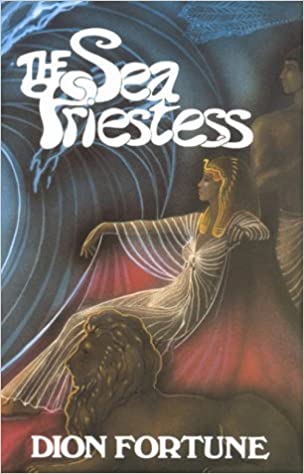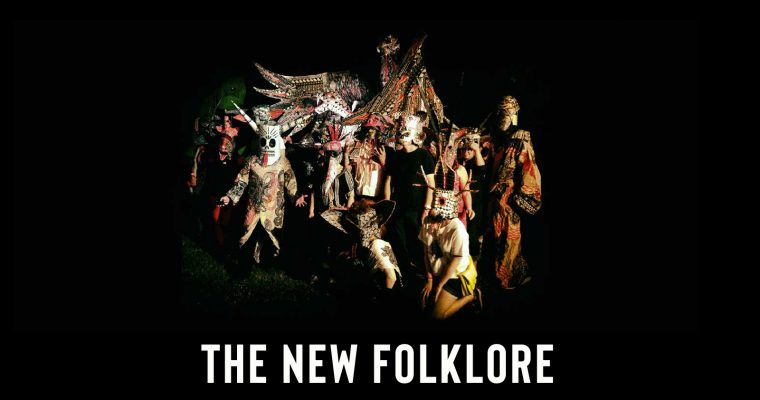
The Sea Priestess is a 1938 novel by Dion Fortune, one of those books which is simultaneously oddly significant and mostly forgotten. And “oddly” is probably precisely the right word to describe its significance, since its idea have filtered down into many branches of the whole modern neopagan movement.
Dion Fortune was born in 1890 to an English family living in North Wales. From her teenage years until her death in 1946, she was right in the middle of the tangle of Theosophy, Spiritualism, invented ritual, ceremonial magic, backbiting, and adultery that filled the time of a significant chunk of the English upper middle class in the first half of the Twentieth century. Fortune was a founding member of Fraternity of the Inner Light and a member or associate of multiple similar organizations. She saw her novels as a way to introduce, subconsciously, her ideas about the nature of the universe to a broad public. And oy, such ideas.
The novel concerns itself with an asthmatic real estate agent living in Southwest England, Wilfred Maxwell, who stumbles into an acquaintance with Vivien Le Fay Morgan, the latest incarnation of the sorceress Morgan Le Fay from Arthurian legend. Morgan is, in this version, also a priestess from the lost content of Atlantis, whose cult had a branch location on the English coast where the novel takes place.
One of the interesting thing about these lost worlds opening doors unto hidden knowledge is how conveniently close they always are to the author’s home. From Joseph Smith finding the golden tablets on a nearby hill, to Prince Madoc just happening to land at Mobile Bay, to the various places that traces of Atlantis have popped up over the world, it seems you never have to travel too far to encounter knowledge which has been lost for ages. In this case, just a little trip down to where the Narrow Dick flows to meet the sea at the little town of Dickmouth. Yes, that is the name of the town, and yes, there are multiple times when those words shows up in a sentence in a very awkward way.
Vivien Le Fay Morgan takes Wilfred under her wing, or perhaps under one the diaphanous capes she’s continually described as wearing, gaining his assistance in restoring a house sitting on a point at Bell Head by the lost temple of Atlantis. She leads him through a series of spiritual revelations, culminating in recreating an Atlantean ritual, after which she disappears into the sea. It’s not really a book you read for the plot.
The novel’s chief attraction is its presentation of Fortune’s take on the nature of reality and spirituality, the dark, occult heart of which can essentially be condensed down into “All gods are one god, all goddesses are one goddess.” Which is interesting, because that’s where her plan of introducing these ideas to a larger audience seems to have worked. Those very words are the Wikipedia-official version of the Wiccan view on the nature of divinity. It’s also fascinating that this introduction of theology through myth and fiction is the same approach that C.S. Lewis would take when writing his Chronicles of Narnia series. Fortune’s book was popular enough in England at the time of its publication that Lewis may well have encountered it. There’s probably a master’s thesis somewhere if someone feels like digging into how he happened to come up with exactly the same idea just a few years later. While Fortune’s writing can often be genuinely witty, it tends to get bogged down when it turns explicitly occult. The following passage is typical:
Isis Veiled, I knew, was Our Lady of Nature, just as Isis Unveiled is the Heavenly Isis. Ea was the soul of Space and parent of Time, older even than the Titans. Binah, the Dark Sterile Mother of All, was the Great Sea whence life arose, the female principle and pre-matter. And Ge herself was the magnetic earth that is like an aura to our globe and in which move the tides that the Easterns call the Tattvas. These things I knew, for Morgan had already told me, and I realized that I was now watching them.
This passage is a condensation of the chief problem with all of occultism. All of these words sound meaningful when you string them together, but if you know what they mean individually the entire passage becomes a collapsed soufflé of gibberish. And this book serves up a lot of failed soufflé. Fortune treats us to repeated visions of Lost Atlantis, which seemed to be a place where people were continually parading in long lines, holding torches, and wearing white robes. A world where the priest and the priestess are the central focus of all life on the continent, and their job seems to be embodying energies and communing with ethereal planes. And is you can see, those planes were in restricted neighborhoods. The mention of “the Easterns” as if it means something is typical of the kind of casual racism that permeates the book. Atlantis, in this vision, was very white.
But what emerges from all of this, and from the “All gods are one god, all goddesses are one goddess” creed, is a vision of a universe divided into complimentary masculine and feminine sexual energies. The active masculine draw energy from the passive feminine, which in turn is renewed by masculine worship. The woman should embody the dark and mysterious ocean, and the man must follow the pull of the moon towards her. Vivien Le Fey Morgan is presented as the apotheosis of this. Her face is always veiled in public. She continually drops cryptic phrases into conversation. She glides across floors more often than she walks across the. She is filled with deep, esoteric knowledge without ever having actually done any work to acquire it. The role of feminine energy, in Fortune’s view, is to simply be, and then when one subsumes oneself to this energy, things simply happen. It’s the sort of religion which could only spring from the mind of someone who has never done her own laundry.
It’s last third of the novel where this dynamic becomes genuinely fascinating. Having learned the secrets of the universe from the now-vanished Morgan, the previously passive Wilfred begins to assert himself in his own life and soon marries Molly Coke, the daughter of his former headmaster, whom he rescues from an abusive stepfather. Through Wilfred’s instruction and some implied spiritual intervention, Molly awakens to the feminine energy and learns to see herself as “embodying all women,” which allows the Maxwells to settle down into a spiritually enlightened, conventionally dull marriage. Spending quiet evenings in a little cottage, Molly keeping house, Wilfred rising to become one of the most prominent men in Dickmouth. Spiritual instruction, applied to people who are misaligned in their proper, predetermined roles in life, allows them to become fulfilled in conventional roles. It’s a structure and a lesson which could just as easily be taken from any modern Christian romance novel.
And that’s where The Sea Priestess and the whole occultist worldview leaves me ever so slightly cold. It’s sort of dull, Tory conservatism which has convinced itself that it is profundity. That mistakes wearing flowing gowns and speaking in crypticisms for being actually interesting. That mistakes playing with a Ouija board instead of playing Scrabble as revolutionary. That constructs a curio-cabinet aesthetic filled with decontextualized knick knacks from across the empire. That often enables abusive sexuality by drawing a chalk circle around it. It’s adolescent at best, horrific at worst. And it’s a sort of mental distancing which allows someone to see themselves as being removed from complicity with the whole brutal system, but still enjoying the privileges of that system.
This may seem like a lot to lay on the head of a seventy-year old novel that has been mostly out of print for the past few decades. Particularly if, judging by the cover, that head already seems to be wearing a particularly fabulous tiara. But as the sort of decontextualized, consumer-capitalist form of religion that neopaganism shares with evangelical Christianity continues to grow and gather strength, turning a critical eye to the foundational texts and looking at these movements within their originating context seems increasingly important. Narrative is the tool of ideology, and being conscious of those ideologies that shape the stories we tell about ourselves is essential as we navigate our relationships with ourselves and others. And metaphysical narrative is often just an excuse to maintain existing power structures, because there’s almost complete freedom in how metaphysical narratives are constructed. No one is going to show up from Atlantis to fact check the Sea Priestess. But we need to confront that appealing to the authority of Atlantis is really just people making shit up.
That’s not to say that all of this is necessarily bad, or wrong. There are promising possibilities that can come from developing religious and folkloric perspectives that are deliberately constructed to cope with the baffling cacophony of post-modern life. I mean, if I could just get a tiara like the one she’s wearing I would be well on my way to being happy. But the recognition that these perspectives are being deliberately constructed, and that that construction is happening within an established, inescapable ideological context, that that brings with it a responsibility of being actively aware of context while constructing those new narratives. And that’s where the Narrow Dick hits the sea.

2 responses to “The Sea Priestess and the Origins of Neopaganism”
Not sure what your particular spiritual cup of tea is, but it’s obviously not Wicca, or you’d know that vast numbers of Wiccans have moved on from the duotheism of Dion Fortune, and the notion of “masculine energy” and “feminine energy”.
I wouldn’t have liked to live in Atlantis as described by Ms Fortune, but she does an excellent description of landscape and I like the poetry.
Fair point about it being dreamed up by someone who never had to do their own laundry though!
First off, thanks for the small ego boost that comes from someone I don’t know having read this. Agreed that Fortune’s prose has a very pleasant, drifting quality to it. And yes, her landscape descriptions are very evocative, and she had a deep familiarity with the places she write about. But I still say she never moves beyond what is familiar – and dressing the familiar up in diaphanous robes is not the same as insight, it could even be called obfuscation. And, yes, I”m no at all Wiccan but I am aware of how the discourse within the religion has shifted radically in the past few years – but that’s a very, very recent shift and, much like all that diaphanous laundry that was passed down from Fortune to Stevie Nicks and from there transformed into goth, traces remains and the history remains, and that’s chiefly what I’m looking at here. Again, thanks for reading and thanks for taking the time to comment.